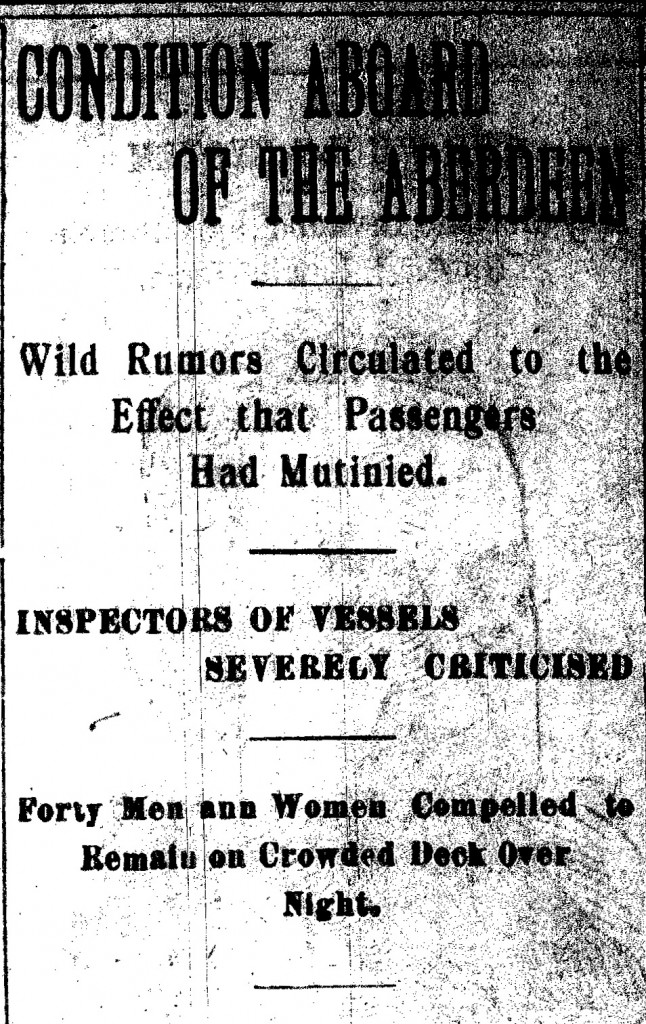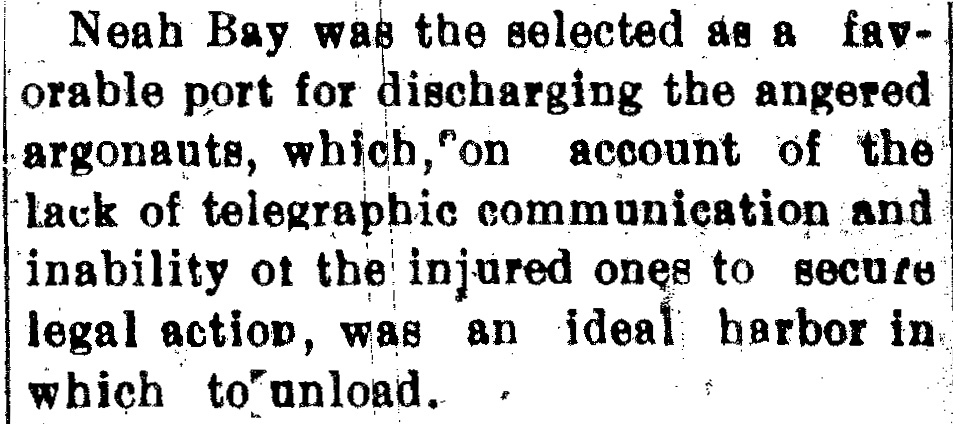 From the desk of Steve Willis, Central Library Services Program Manager of the Washington State Library
From the desk of Steve Willis, Central Library Services Program Manager of the Washington State Library
In the last few years we have read about cruise ship vacations gone bad, to the point where the passengers form a “mutiny.” As we can see by the May 31, 1900 article from Port Townsend’s Weekly Leader, this sort of thing is nothing new:
CONDITION ABOARD OF THE ABERDEEN
Wild Rumors Circulated to the Effect that Passengers Had Mutinied.
INSPECTORS OF VESSELS SEVERELY CRITICISED
Forty Men and Women Compelled to Remain on Crowded Deck Over Night.
“Wild rumors were floating up and down the coast yesterday and correspondents here were queried relative to the report that mutiny had occurred on board the steam schooner Aberdeen, which sailed for Cape Nome last Monday, and that the captain in order to quell the mutiny had killed the men. This report as it traveled lost none of its sensational features and the coast press was anxious to secure a confirmation or denial and hence correspondents here received numerous telegrams of inquiry, but were unable to obtain anything further than the report.”
“However, from all accounts there was some trouble aboard the vessel before she passed Cape Flattery and after getting out to sea there is every indication that more trouble occurred, but probably to no such serious extent as indicated in the rumors.”
“One of the Aberdeen‘s passengers sent the following to the Oregonian, which gives a fair insight into the condition of affairs on board of that vessel before she passed out to sea, and under such conditions before the vessel reached the billowy ocean, when passengers commenced getting seasick, it is a hard matter to conjecture just what might happen and perhaps it was on the strength of which the wild rumors were circulated:”
“Aboard the Aberdeen, Neah Bay, May 21, 2 P.M.– The steamer Aberdeen left Seattle at 2:30 this morning, with over 300 passengers, and accommodations for but 160. Many of those aboard loudly demanded return of passage money and over 40 men and women were kept on the crowded decks over night without berths.”
“Towards morning the passengers became mutinous, and the order was given to put in to Port Townsend and discharge the overloaded vessel, which order was soon changed by the captain when it became evident that many of those on board were anxious for a chance to libel the ship for breach of contract and obtaining money under false pretenses.”
“Neah Bay was the selected as a favorable port for discharging the angered argonauts, which, on account of the lack of  telegraphic communication and inability of the injured ones to secure legal action, was an ideal harbor in which to unload.”
telegraphic communication and inability of the injured ones to secure legal action, was an ideal harbor in which to unload.”
“Passengers and crew were fighting all night. Women and men were sleeping out on the open on hay bales. The officers were independent and insolent, and offered but little assistance to the unfortunate ones who had paid $125 for a worse than steerage accommodation.”
“The decks were piled high with freight of all descriptions, including 40 head of horses, lumber, hay, boats, etc. The inspectors passed so many on board that there is not over 60 cubic feet of air space to each passenger, while the deck space is so limited that there is no opportunity for any exercise whatever, and they are compelled to remain in the stuffy staterooms, while there are six sleeping in rooms 6×7 feet, or considerably less than 60 cubic feet for each passenger. So much freight was loaded at the last moment that it was decided to take the inside passage, in order to lesson the danger to life.”
“The passengers are furious, and threaten legal action against the promoters of the iniquitous enterprise, as well as bodily injury to members of the crew. Unless something is done to alleviate their grievances, a general uprising will result and passengers will take matters into their own hands.”
“Shipping men on the Sound are unanimous in saying that if the inspector would establish a rule not to allow any craft, no matter what her condition or what trade he wished to engage in, more than double her regular passenger allowance, it would quickly put a stop to vessels putting to sea in the cramped condition of the Aberdeen and a dozen others this month. Such a rule would allow the Aberdeen 62 passengers, fully 200 less than she had on board when she lay alongside the dock in Seattle.”
The Aberdeen was among the first ships to bring legions of goldseekers to Cape Nome. Obviously commercial maritime transportation was caught by surprise when gold fever hit the lower 48.





